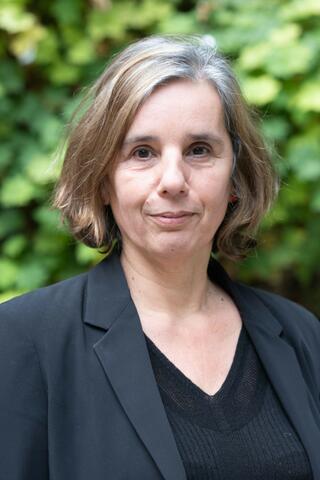
Caroline Michel d'Annoville
Co-pilot of the thematic program “Societies in change” of the SOUND project
“Our role is both to stimulate dynamic research, to coordinate initiatives and relay them within our communities and the general public.”
Professor of Archeology and Art History at Sorbonne University, Caroline Michel d'Annoville co-pilots the thematic program "Societies in change" of the SOUND project with Juliette Dross. She shares with us her journey and her involvement in this transdisciplinary project, which aims to make the knowledge and expertise of the Sorbonne University Alliance resonate.
Could you describe your background and your current activities?
Caroline Michel d'Annoville: After a double degree in History and Archaeology, I directed excavations and building studies on behalf of associations and local and regional authorities. At the same time, after obtaining the agrégation in history, I prepared a thesis in Late Roman History, which enabled me to join the École française de Rome as a member of the Antiquité section, before being recruited as an associate professor in Roman History at Grenoble Alpes University.
In 2015, after obtaining my habilitation to direct research (HDR), I joined the Faculty of Arts and Humanities at Sorbonne University as a professor of Archaeology and Art History. Since then, in addition to my administrative duties, (I was Director of the department of Art History and Archaeology for five years), I teach courses on Late Antiquity and carry out field research in the south of France and in Tunisia.
In your opinion, what are the objectives and challenges of the SOUND project?
C.M.A.: The SOUND project has a twofold objective: firstly, to reinforce synergy within our academic communities by enabling its members to forge links within Sorbonne University and its Alliance partners. Secondly, to ensure that our knowledge and expertise resonate with society through three major thematic programs: "Changing Societies", "Sustainable Worlds" and "Global Approaches to Health".
The stakes are therefore high for SOUND, since the project must support this collective dynamic, encourage multi-disciplinary approaches while structuring them to tackle today's major issues, and find ways of amplifying our reflections to different audiences.
Why did you want to become the pilot of a thematic program?
C.M.A.: Firstly, to have professional experience in a different setting, on a different scale, on current issues that bring science and society into contact, giving them a historical dimension. In archaeology, research brings together specialists from different scientific fields, from the humanities and social sciences, the exact sciences and life sciences, to cross-reference data and viewpoints. A multi-disciplinary approach is essential to understand a subject, a site or an object, over a period covering all historical periods, including the most recent.
I also wanted to be involved in building a collective dynamic to extend, at the level of the Sorbonne University Alliance, my experience in coordinating teams and/or programs, put to the test in various administrative missions, such as directing my department or participating in various councils (faculty or other groups).
What will your role be as a pilot?
C.M.A.: The role of pilot is a collegial one (six pilots in total, assisted by scientific councils specific to each thematic program). Our role is to provide impetus for research and reflection on the defined themes within the major thematic programs, and to coordinate initiatives before relaying them within our scientific communities and then to a wider public, through actions or media to be created. The aim is to bring this new think-tank to life in a way that has never been done before, and to make it a space that encourages the development of research and development projects, as well as the sharing of our ideas and thoughts in different spheres of society.
